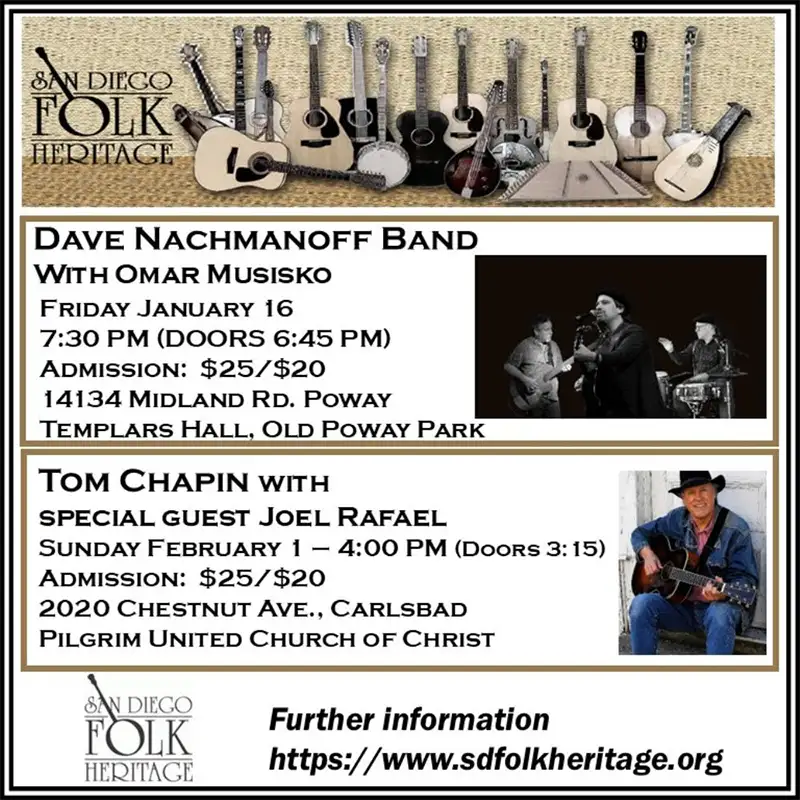Cover Story
JOHN KATCHUR: Living the Life Authentic
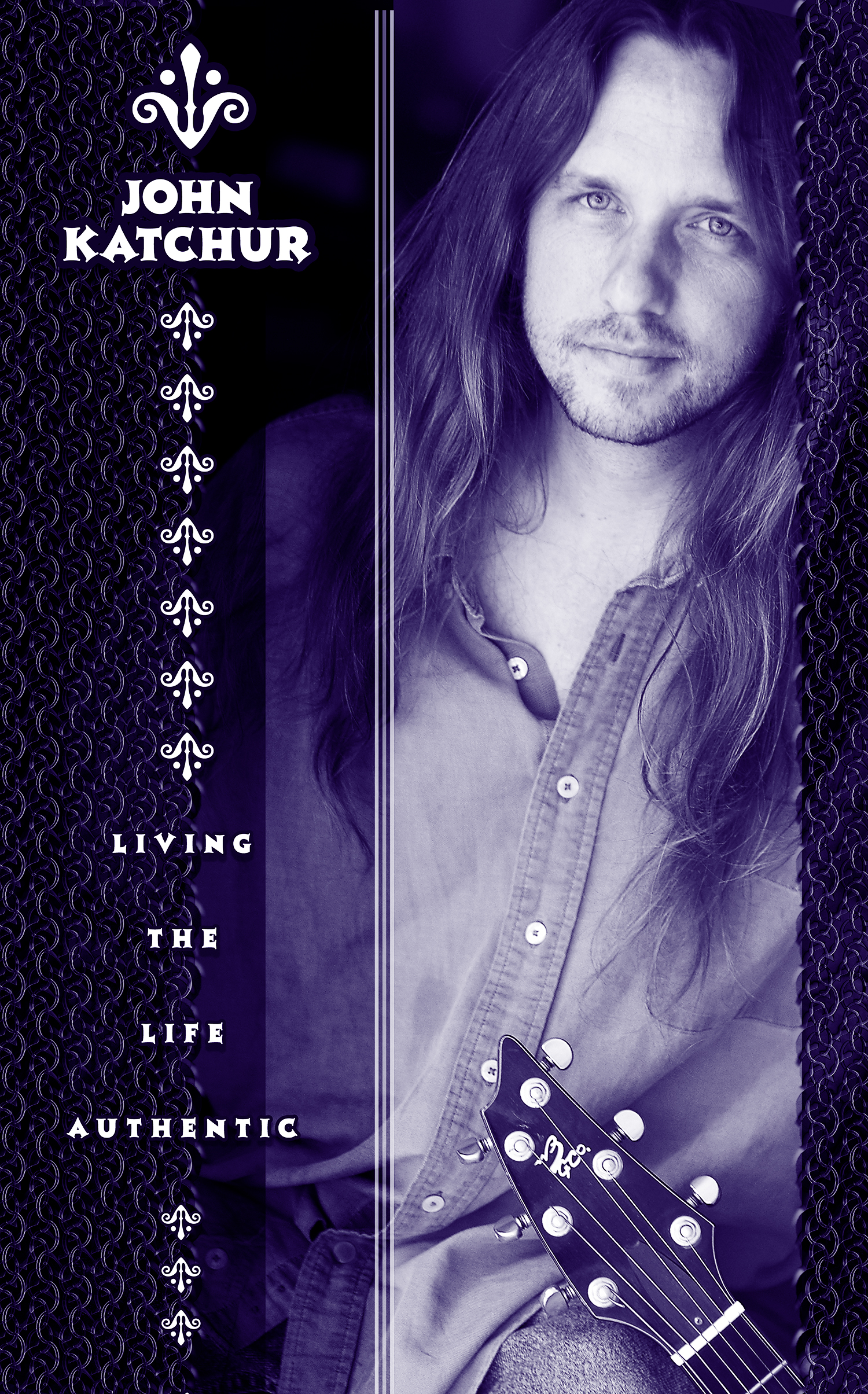
John Katchur. Photo by Gail Donnelly-Seaholm.
Standing outside Croce’s Top Hat Bar & Grill in San Diego’s historic Gaslamp Quarter during a particularly hot, humid summer night in 1991, one could take in a multitude of sounds swirling around Fifth Avenue like some sort of gritty, urban fever dream. Saxophones reaching as far outside the key as the player’s muse will carry them. Loose-tied men in business suits hailing cabs as their comely dates catch their heels and swear at the grates that dot the sidewalks. Pedestrians, cars, buses and bicycles vie loudly at the change of every light.
Somehow, through all of this symphony of chaos, I heard the voice of a young woman call to me. She had the posture of a much cooler climate.
“Hey, you like acoustic music?”
“Do I like what?” I ask, immediately realizing that having a conversation downtown at night with a stranger regarding “what I like” may not be the best course for one follow.
“Songwriters. You like singer/songwriters?”
“Well, actually, I do!” I replied, with a sardonic mixture of pride and curiosity born from the knowledge that there were at that time about two and a half places that anyone with an acoustic guitar could even walk near, much less play inside of.
She pointed into a wide, subtly foreboding doorway. “Go upstairs. Trust me. You’ll like it.”
The Insomniac, as it was called, was three tastefully adorned brick walls with a fourth that was basically just windows that faced out onto Fifth, all of them opened and allowing pretty much the same aural experience I had downstairs.
But then I heard a new sound join the mix. Somebody was playing guitar with equal measures of grace, complexity, and fearless confidence. I spun around and took in the outline of John Katchur.
He seemed a bit frail and thin, his now trademark lengthy hair making him actually appear to be lifting upward, like some sort of harp strumming angel…. Seriously, he was even back-lit.
He approached the microphone and revealed an unbelievably effortless, sonorous, aching voice.
“You will never make it home from Mercy Road…,” he intoned with restrained tension and pathos, as if something even darker and more powerful lurked just below the surface. His large, but delicate-looking hands playing the guitar like it was a magic trick, wrists and fingers bending and swaying like reeds in a stream, while melodies twisted through hard sixth string thumps and plucked harmonic octaves.
Just as one song was ending and the next beginning, his newly acquired acoustic amp gave him some unexpected trouble in the form of some high-pitched feedback. Pfffffffferrrrrr!!
“I’m just gonna take a second to address some technical difficulties, so ummm…yeah,” says Katchur in a way that brings to mind a kinder, gentler Woody Allen, spins 180 degrees, and makes his way to the amp, which is beginning to really howl by this point.
As he turns the volume down on the amp, I make my way over to the side of the stage.
“Hey, man, do you need any help with the sound or anything?” I ask.
“No, but thanks. I just got this thing and I’m still getting used to it.”
He stands, turns, and puts his guitar back on. “Alright then…where were we?” The room erupts again and John starts into the next song, as if to surf in on that wave of laughter.
The next 45 minutes or so revealed John Katchur to be a simultaneously sincere, funny, creative, and engaging performer, and all of these traits are still in abundant evidence throughout all of his performances and recordings.
A week or two after my brief encounter with Mr. Katchur, I met him again outside of a Bruce Cockburn concert and asked if he’d like to play at the Village Emporium in La Mesa with myself and Carlos Olmeda. He said, “Yes. Sure.” And so our friendship began.
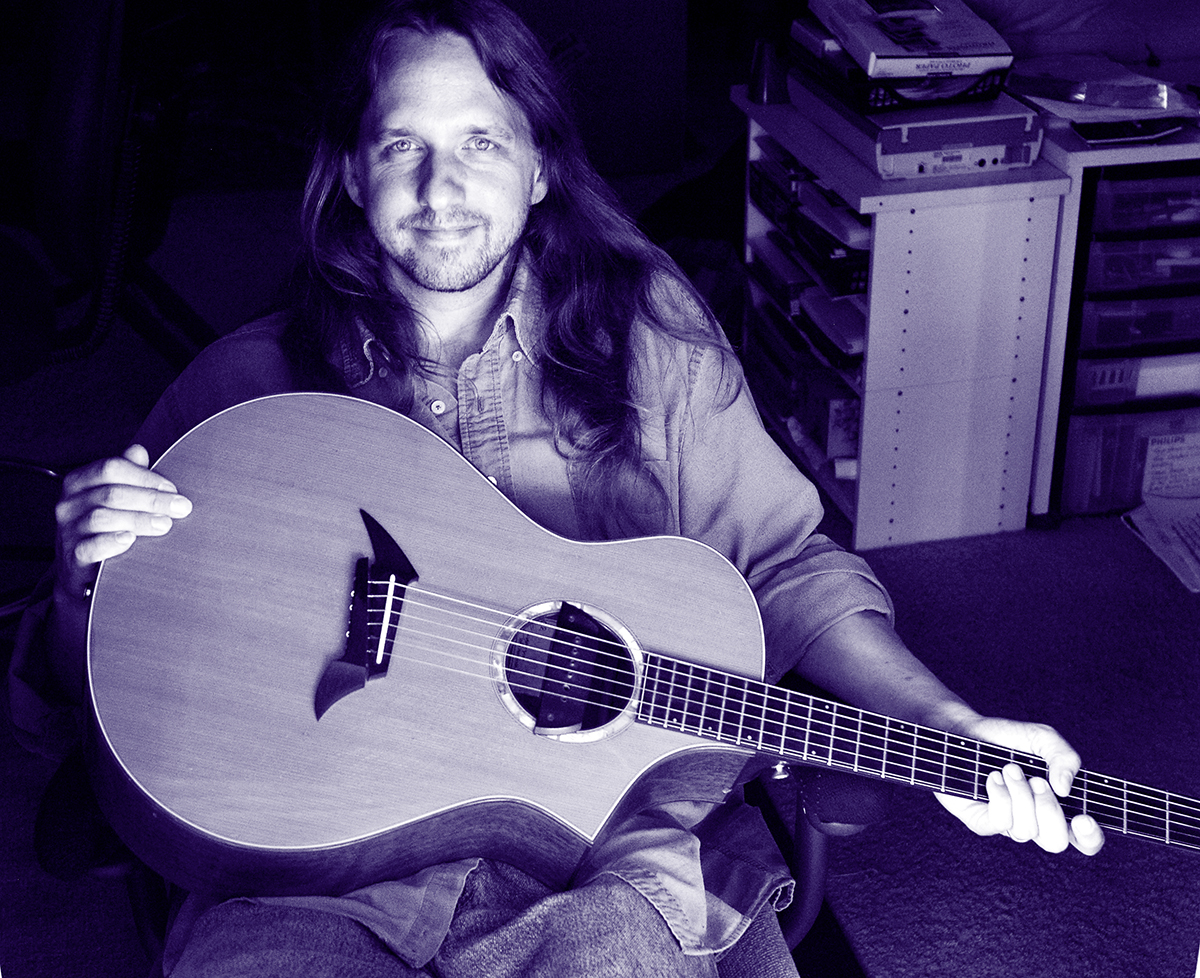
Photo by Gail Donnelly-Seaholm.
From there, John soon showed himself to be not only a very entertaining performer but also an excellent organizer and promoter of music events. Before too long, names people had never heard before became part of an exponentially growing list of performers at Java Joe’s in Poway, where John had established a weekly residency. Many of those names you still see: Dave Howard, Steve Poltz, Gregory Page, Joel Rafael, Peggy Watson, Dan Connor, Jim Earp, the Swamp Poets, Mary Dolan, Joy Eden Harrison, Jeff Berkley, Calman Hart, Lisa Sanders, Frank Lee Drennen, John Bishop, Joe Rathburn, Carlos, myself, and a blonde Alaskan girl named Jewel who worked behind the counter. More on her later…
Now I’m not saying John did it all himself, but he was sitting smack dab in the middle of it anytime I looked, introducing people and accommodating everyone as if they were guests in his home. Getting everyone onto the stage and lighting the way with his increasingly polished stage patter and its deadpan delivery (an effort necessitated by the frequent tuning breaks required to navigate among his myriad altered tunings), all in the service of an amazing set of music that featured, hands down, some of the greatest songs I had ever heard, including David Wilcox’s “Leave It Like It Is” and “Chet Baker’s Unsung Swan Song.”
Katchur opened concerts for Wilcox several times subsequently, and one time I actually witnessed Wilcox say some of the nicest things to John with regard to his writing and performing, even taking time to give a few words of advice as to how to live life as a musical artist. As it turns out, John has gained a pretty good handle on that as well.
“Whatever you do, if you do it in an authentic way, where the work is what’s important to you…you can make some kind of living from that. You’ll figure it out. Then you’ll have not just artistic freedom, but financial freedom.”
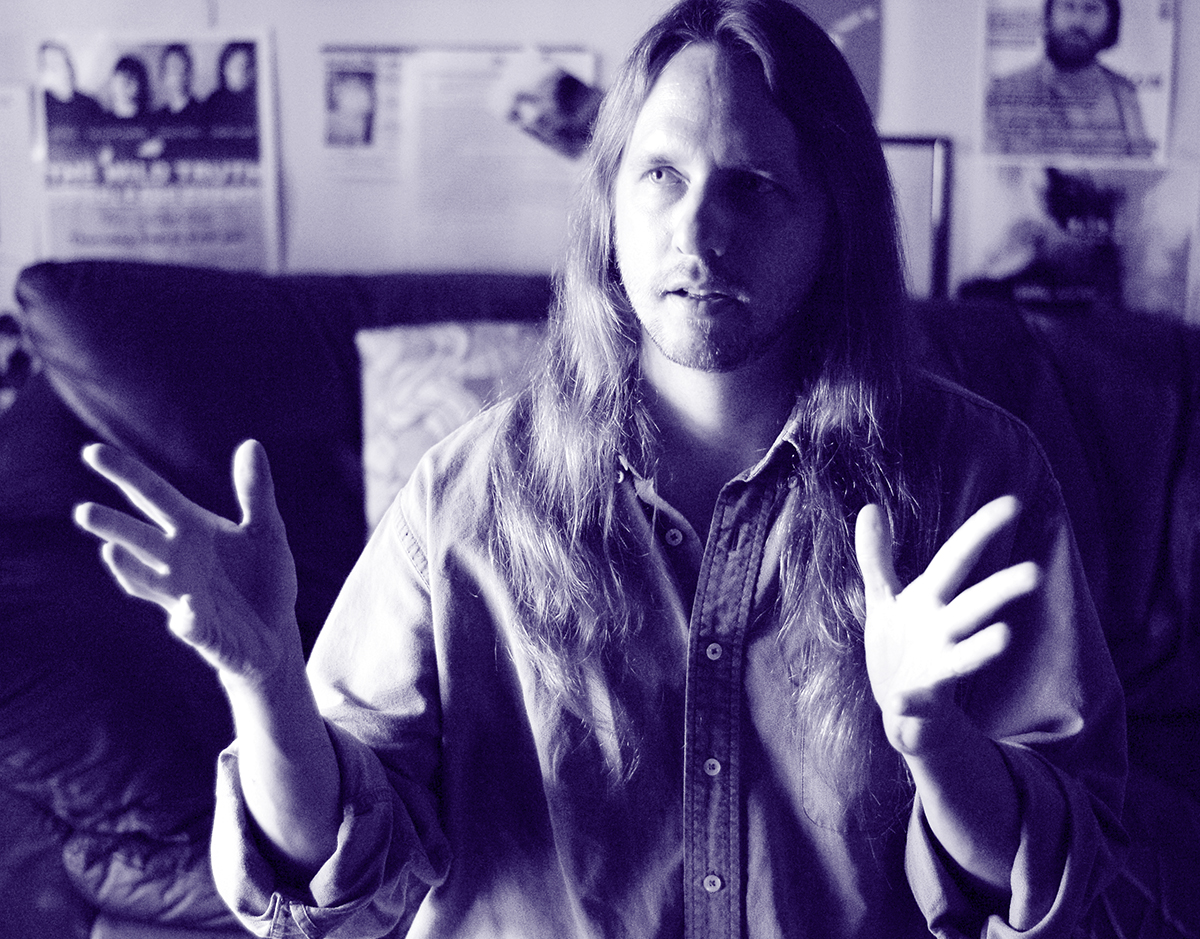
Photo by Gail Donnelly-Seaholm.
So it has been for John for some time now. In addition to his often stunning performances, he also gives guitar lessons, produces and records albums for other artists and for a time, was teaching music and introducing recording to children at a private school. He’s traveled a bit as well, much of it with his wife, Margaret, who teaches piano and is also an accomplished puppeteer. The two even relocated to New Zealand for a time before eventually returning to the states to start a family. Their daughter Leah is four and a half now.
John’s path to a life in music started at almost as early an age.
“I asked for a guitar when I was five, but being the youngest of six, I didn’t get one and start playing it until I was 14. I was always musical though, and I’d pick little melodies out on the piano and stuff.
“I wrote my first song when I was 16 or so. It was written for a psychology class project. It was about domestic abuse. It was called ‘Make You Stay,’ as in I’m gonna make you stay in this relationship. It was about 10 minutes long, with a big heavy metal solo during the ‘beating’ part and everything.”
This illustrates the disparity between John’s easy-going demeanor and his penchant for addressing the darker issues that many songwriters might flinch away from. The previously mentioned “Mercy Road” was the title song from his first CD and dealt with the highly publicized murder of Cara Knott by a highway patrol officer near Katchur’s home. In addition to a hauntingly beautiful melody and gorgeous lyrical imagery, the song’s timeliness and its performances’ proximity to the actual event resonated strongly within the community. Despite the impact of the song, Katchur seems almost casual in assessing his role as its composer.
“I went to school with girls who were also pulled over by that guy. It just seemed like an obvious thing to write about.”
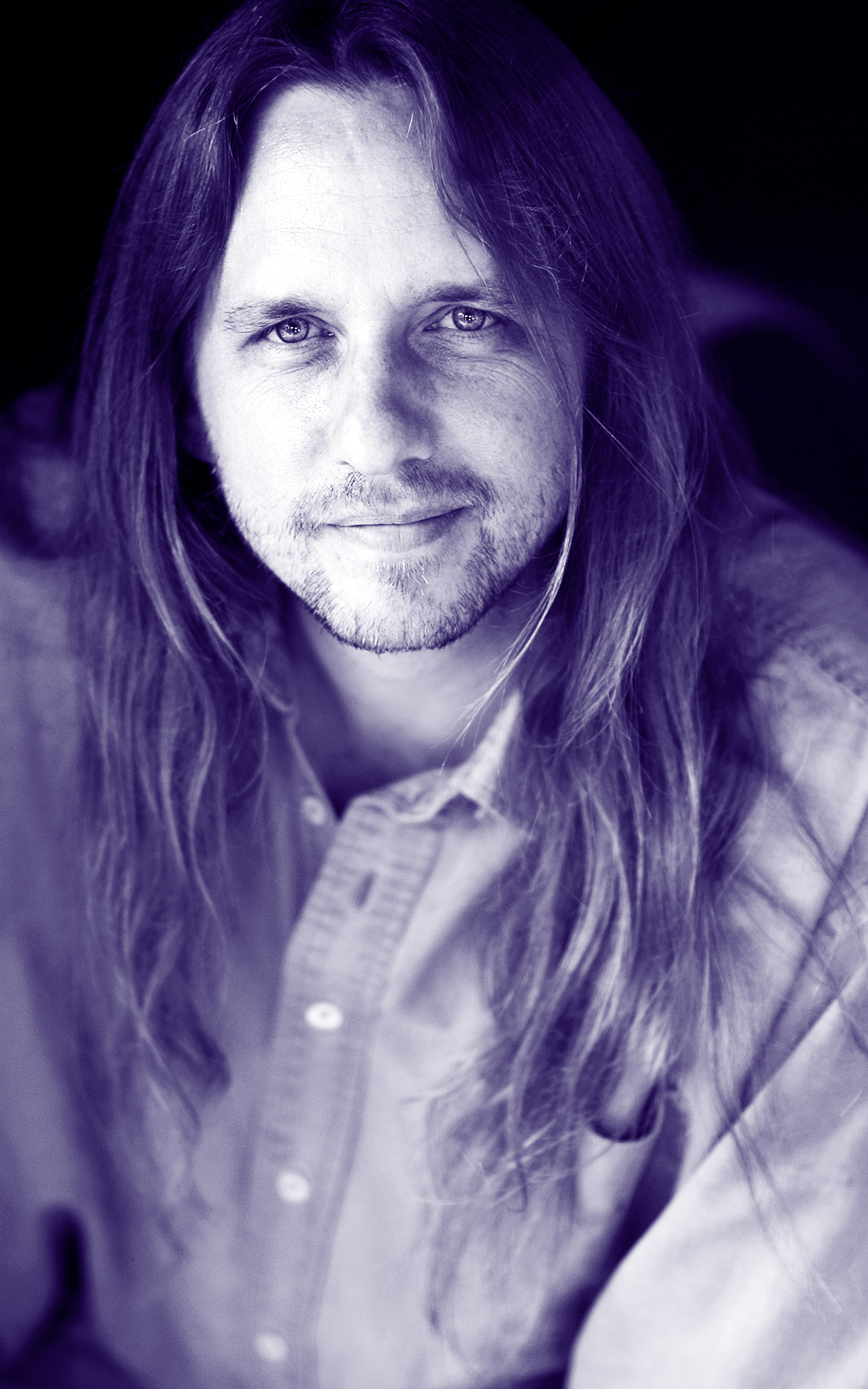
Photo by Gail Donnelly-Seaholm.
The roots of Katchur’s innate ability to integrate these types of weightier issues with such starkly poetic imagery might well be found within what might seem an unlikely source, at least for an acoustic guitar-wielding singer/songwriter.
“I basically learned guitar listening to Black Sabbath. I was immediately attracted to the more song-oriented music from these really heavy rock bands. Like Led Zeppelin III…I was waaay into that.”
I can personally attest to John’s love for playing electric guitar. One day while driving together to a gig several years ago, he pulled a weathered looking cassette tape out of his pocket.
“Wanna hear something cool?” he asked, with a particularly mischievous smile.
“Sure!” I replied as he pressed the ‘play’ button.
What followed was a mind blowing assault on the senses. The instrumental piece featured meticulous Dio-esque classical runs, whammy-bar dive bombs and a ridiculously well arranged army of distorted electric guitars, all of which were rendered at the breakneck speed of a runaway locomotive.
“That,” said Katchur, grinning from ear to ear as he ejected the tape at the song’s conclusion, “is something I really love doing.”
Of course, reconciling a songwriter’s sensibility with his inner rock god guitarist can be a somewhat tricky proposition, and it appears that over time he has finally come to terms with these apparent contradictions.
Katchur’s latest CD, Beauty and the Terrible Things, will celebrate its release on Friday, October 3 at the Handlery Hotel in Mission Valley, and Katchur’s professed penchant for the electric guitar will be found in greater evidence than on previous recordings. Also appearing with greater frequency are drums, organ, electric piano, and ambient textures that carry elements through the lush soundscapes like magic flying carpets The dark hip-hop/jazz fusion instrumental “Warcraft” showcases these fresh ingredients nicely.
Longtime fans will still be rewarded with several of his longtime hallmarks: beautifully intricate acoustic guitars, the airy high end sheen and hi-fi recording and, of course, John’s voice, uniquely his own yet universal in its timbre and delivery.
I don’t care about fitting into one thing anymore. I want to make the music that I like to hear and play, and with this [new] album I feel like I’ve totally done that. That is the most accurate illustration of where I’m at now.
— John Katchur
“Cumulus clouds in the sunset / bloom like flowers of flame / The black palms bow to the savior breeze / but I get to feel its kiss,” he sings at the album’s opening, the poetry unfurling as effortlessly as morning breakfast conversation.
“Most of the songs on Mercy Road were ‘message’ songs with short, concise stories.” explains John. “You knew what the point of the song was, with little ‘morals’ or whatever. Whereas when I did the next record, Friend of the Moon, it was much more poetic…I didn’t know what I was saying and I actually like that approach better.”
That he shows such a keen perspective on his past work is no accident, as it would appear that Katchur has made a concerted effort to make the music he most wants to this time around.
“I was always trying to fit in with the House Concert scene or whatever…the singer/songwriter acoustic thing…I moved from genre to genre to find one that I could truly claim, where I could find a home. But the truth is I ended up taking little bits from each one, and I’m just going with that now. I realized I just don’t care. I don’t care about fitting into one thing anymore. I want to make the music that I like to hear and play, and with this album I feel like I’ve totally done that. That is the most accurate illustration of where I’m at now.”
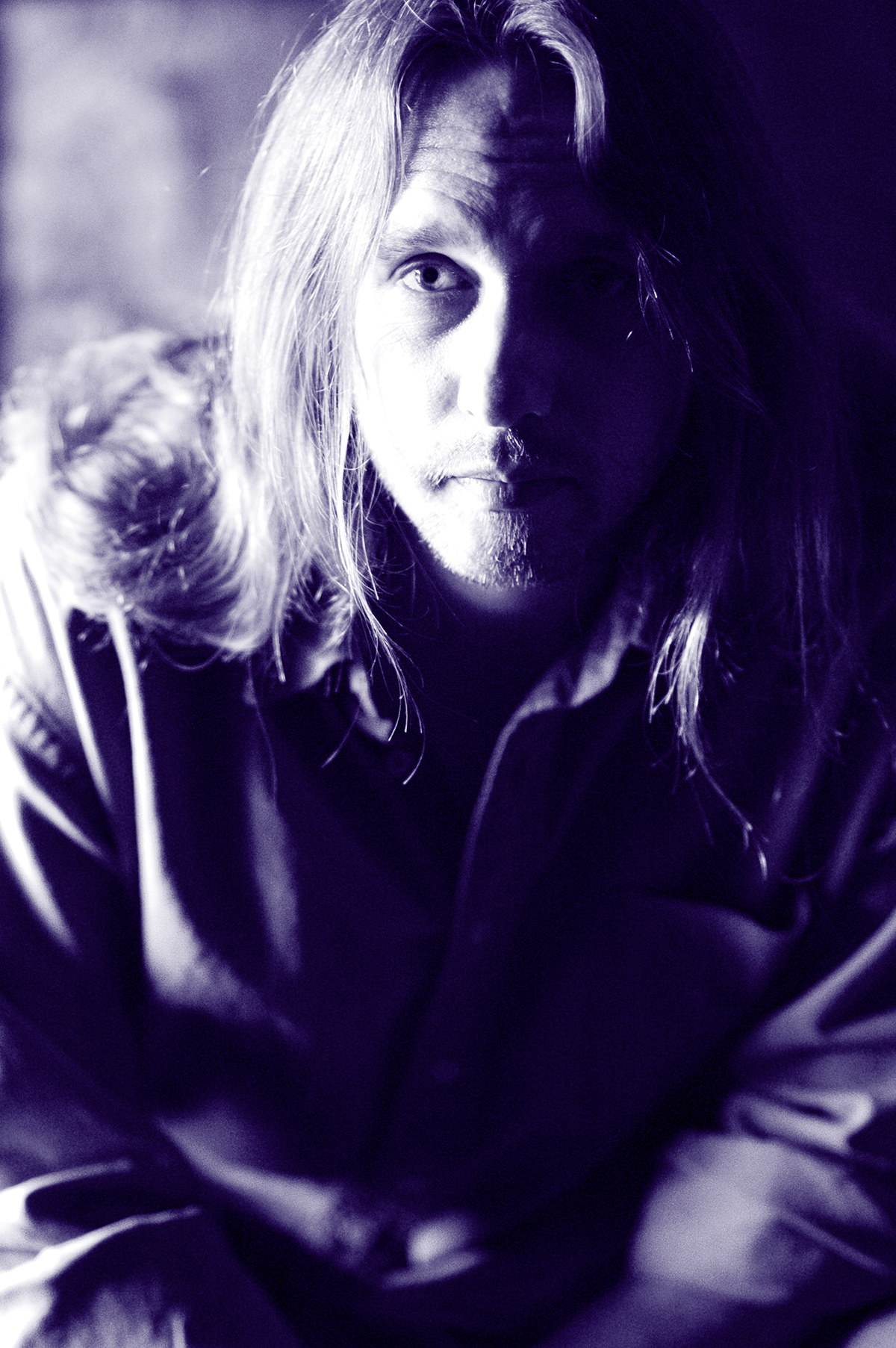
Photo by Gail Donnelly-Seaholm.
John Katchur does seem to carry himself with a much more contented manner. When asked about that, he seems eager to explain. “My life seems more seamless now.”, says John. “I have so many things that I am interested in, and I become so obsessive about every hobby that I pick up, that in the past…it made it difficult to be successful at any one of them.”
My mind wanders down memory lane again, recalling John’s almost unnatural preoccupations with things like fishing (and in particular, the Pocket Fisherman infomercials that prompted his purchase of one), professional poker, teaching, and altered tunings.
“Now, after a lot of years gone by, it all just feels like one activity. I try to approach everything I do in an artful way. From that perspective, the harvest that you reap all seems like the same paycheck. When I was younger, there was a lot more angst because I felt so scattered.”
His past examined and the present revealed, our conversation turns toward the future, and his plans for it.
“Musically, I’d like to do an instrumental album of, like, acoustic guitar. I’ve got that sort of mapped out – songs in my head that I want to record. I’m really just trying to put one foot in front of the other and keep going.”
“I’ve been thinking a lot about touring, about playing more shows in general. Really, since Leah was born I haven’t been interested in playing out much these last few years.”
That John has chosen to stay closer to home and family should come as little surprise to those of us who know him. His parents, Jack and Wanda, were always front row fixtures at his shows, fervent supporters of not only their son’s music but also the scene in general until their move out of state. They’ve since recently relocated back to the San Diego area, and they still stand as a shining example of how much power familial encouragement can hold for fledgling artists.
You can see that love paid forward in listening to John describe showing his daughter how to eat ice cream with a French fry.
“She said, ‘You do what? Noooooo.’ like it was the most bizarre thing she’d ever heard of,” he says with a laugh that could only emanate from the proudest of parents. He falls silent for a moment and then says quietly,
“She’s so awesome.”
Obviously a family trait, that awesomeness.



